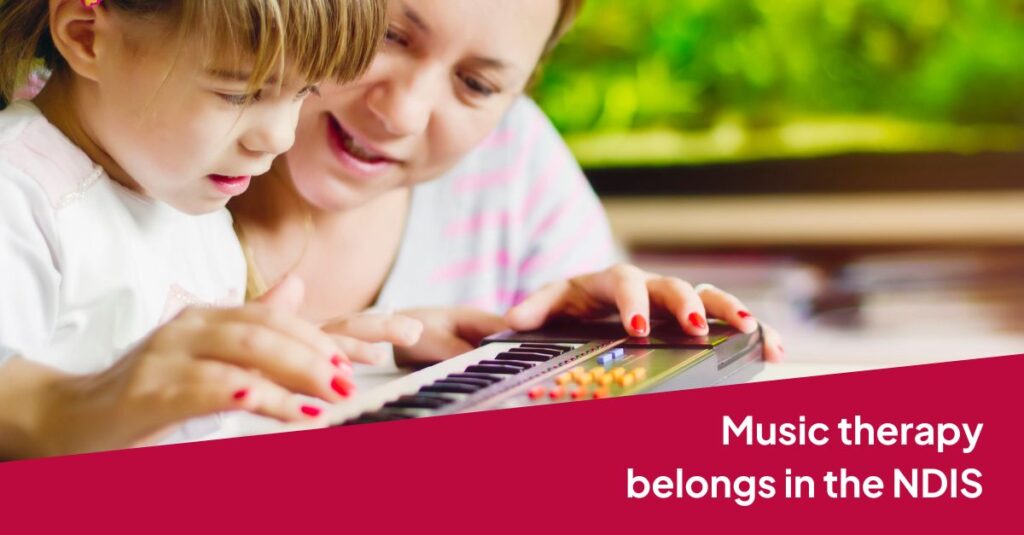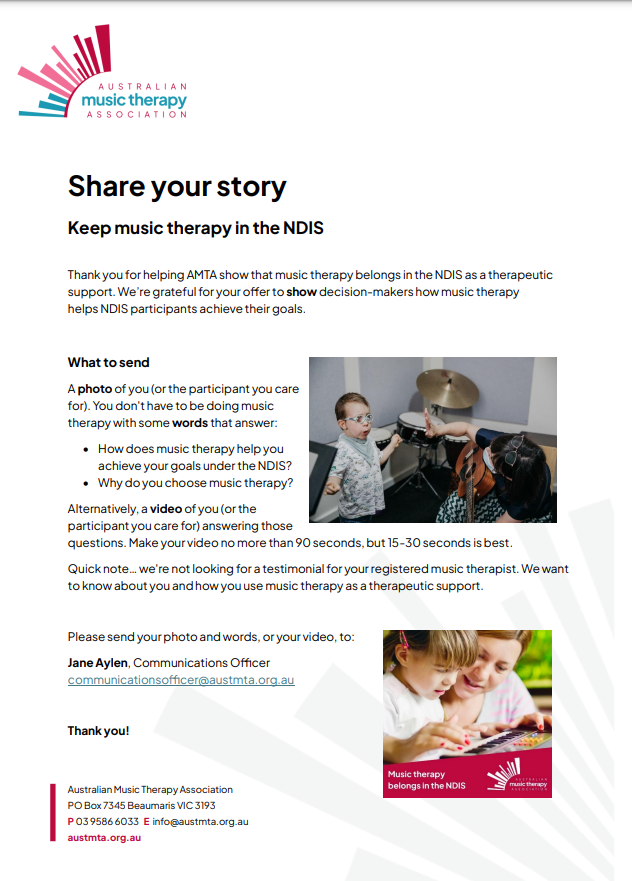
30 December 2024
| |
|
Suggested email template for participants
Dear Dr Duckett,
I am writing in response to your invitation via the National Disability Insurance Agency’s (NDIA) Participant First newsletter published on 23 December 2024, to contribute to your review of music therapy as a therapy support in the NDIS commissioned by the NDIA on 13 December 2024.
I understand the review has come about after sustained advocacy by the peak body, the Australian Music Therapy Association (AMTA), music therapy professionals and participants opposing a leaked decision by the NDIA in late November to remove music therapy as a NDIS support in the absence of any consultation. Thousands of participants and their families across the country will be impacted by this decision and I am/someone I care for is one of them.
Therapy supports provide NDIS participants with critical, often life-changing results, through goal-directed therapy. Music therapy is one of the many allied health professions providing therapy supports in the NDIS, along with occupational therapy and speech therapy.
Music therapy is supported by a strong evidence base and delivers significant functional outcomes for participants. Music therapy professionals who deliver this therapeutic support are university-qualified and meet the stringent registration and ongoing compliance requirements set out by the AMTA as a member of the National Alliance of Self Regulating Health Professions (NASRHP).
I acknowledge the importance of ensuring the sustainability of the NDIS for future generations. The NDIA has stated for evidence-based therapy to be funded through the Scheme, there needs to be evidence that the therapy helps participants improve or maintain their functional capacity in areas such as language and communication, personal care, mobility, interpersonal interactions and community living.
As a music therapy professional/participant/family member I have experienced first-hand the importance of tailored music therapy programs, delivered by qualified music therapy professionals registered through the AMTA.
{Insert example here}
I note the AMTA will be collaborative in supporting your review and have also requested you meet with participants, their families and music therapy professionals to hear first-hand the importance of music therapy supports.
I appreciate your consideration of this matter and would value your support and advocacy.
Yours sincerely,
Your name
30th November 2024 – Come back for updates as they come to hand.
Dear Parents, Carers and Other Stakeholders,
Since day one of the NDIS, Music Therapy has been a funded therapeutic support. Prior to that, music therapy was accessible via the Helping Children with Autism funding scheme.
From 1st February, 2025, the National Disability Insurance Agency intends to restrict access to music therapy as follows:
- Participants will be able to access music therapy through two different ways through their community participation budget, not their Capacity Building – Improved Daily Living (therapy supports) budget (as is currently the case)
- At a group rate of $193.99 an hour when delivered to a minimum of 4 participants by a registered provider.
- At a 1 to 1 rate of $67.56 an hour when delivered by a registered provider. This is not financially viable.
No-one in the music therapy community was consulted about this decision. Neither the NDIA nor the Department of Social Services has provided a clear reason for the decision except to say that:
“The allowable NDIS list includes ‘evidence-based therapy to help participants improve or maintain their functional capacity in areas such as language and communication, personal care, mobility and movement, interpersonal interactions, functioning (including psychosocial functioning) and community living. This includes an assessment by health professionals for support planning and review as required’. Therapy (for example psychology or occupational therapy) is paid at a higher rate than many other activities funded through the NDIS.
We understand that the evidence base in relation to art and music therapy is continuing to be developed, as it relates to disability-related support. In recognition of this the NDIA is referring art and music therapy to be assessed by the NDIS Evidence Advisory Committee (NDIS EAC).”
The Australian Music Therapy Association (AMTA) is releasing regular updates here.
We are working around the clock to request Minister Shorten’s support to have this decision overturned by the NDIA. Our director, Monica Zidar, is also the president of the AMTA and will be travelling to meet with Minister Shorten, later this week to request his support to have music therapy held to the same standards and review processes as other allied health professions, like speech pathology and occupational therapy. The AMTA is asking for parity with its allied health colleagues.
There is currently NO INTERRUPTION to music therapy services. You will be advised immediately, if this changes.
In the meantime, we need your help.
If music therapy has benefitted you or someone you care for, please consider doing any or all the following:
- Contact your local Member of Parliament (Federal) via phone and/or email. We suggest contacting the MP for the area in which you live, as they are elected to represent your interests. You can find out who your local MP is here: https://www.aph.gov.au/senators_and_members/members
When calling/emailing, we suggest:
- Voicing your concern about the decision and asking that it be reversed.
- The phone will be answered by one of the Minister’s staff – specifically ask that they tell the Minister about your concerns.
- Outline how music therapy has benefitted you or someone you care for (particularly how music therapy has been helpful in ways that other therapies have not).
- Outline how your life or the life of someone you care for would be different if it wasn’t for music therapy.
- Ask for your name and contact information to be recorded, so you can be contacted with any updates.
- Ask for an appointment to speak to your local MP in person about this issue.
- Please be respectful and polite. This is how we will gain the most traction.
Follow this link for some general guidance about contacting an MP’s office (the
information is in relation to marine conservation but the principles are the same):
https://www.marineconservation.org.au/tips-calling-member-parliament/.
- Contact the Minister for the NDIS, Bill Shorten via phone on (03) 9326 1300 or email bill.shorten.mp@aph.gov.au
- Contact the Shadow Minister for the NDIS, Michael Sukkar via phone on 03 9874 1711 or email his Advisor, Vincent at michael.sukkar.mp@aph.gov.au.
- Ask Mr Sukkar’s office if his office is a) aware of the decision, b) what his office is doing to lobby the government to pause/reverse the decision and c) if his office has any advice on steps you can take.
- Use the Complaints form on the Department of Social Services website to make a complaint.
- Use the Contact Form on the NDIS Commission website to make a complaint about the decision.
- Sign the Change.Org petition.
- Share the above information on your social media accounts, forward this email to your database and inform your networks.
We acknowledge that this is a challenging time for registered music therapists, AMTA members, NDIS participants who benefit from music therapy and their families or carers. We will continue to update you on our actions and more information as it comes to light.
Monica Zidar
BA(Music), GDipMusThy
Principal Registered Music Therapist and Director of QPAH
President of the Australian Music Therapy Association

